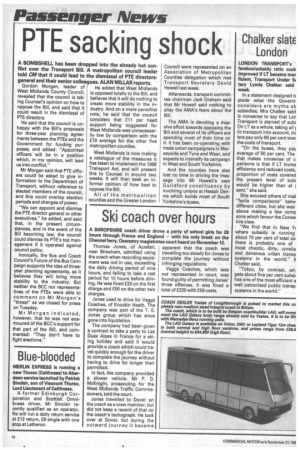PTE sacking shock
Page 14

If you've noticed an error in this article please click here to report it so we can fix it.
A BOMBSHELL has been dropped into the already hot conflict over the Transport Bill. A metropolitan council leader told CM that it could lead to the dismissal of PTE directorsgeneral and their senior colleagues. ALAN MILLAR reports,
Gordon Morgan, leader of West Midlands County Council, revealed that the council is taking Counsel's opinion on how to oppose the Bill, and said that it could result in the dismissal of PTE directors.
He said that the council is unhappy with the Bill's proposals for three-year planning agreements between the PTEs and the Government for funding purposes, and added: "Appointed officers will be in a position which, in my opinion, will lead us into conflict."
Mr Morgan said that PTE officers could be asked to give information to the Department of Transport, without reference to elected members of the council, and this could overlap election periods and changes of power.
"We can appoint and dismiss the PTE director general or other executives," he added, and said that, in the present circumstances, and in the event of the Bill becoming law, the council could dismiss its PTE's top management if it operated against council policy.
Ironically, the Bus and Coach Council's Future of the Bus Campaign supports the idea of threeyear planning agreements, as it .believes they will bring more stability to the industry. But neither the BCC nor representatives of the PTEs were able to comment on Mr Morgan's "threat" as we closed for press on Tuesday.
Mr Morgan indicated, however, that he was not enamoured of the BCC's support for that part of the Bill, and commented: "They don't have to fight elections." He added that West Midlands is opposed totally to the Bill, and believes that it will do nothing to create more stability in the industry. And on a more parochial note, he said that the council considers that £11 per head support being suggested for West Midlands was unnecessarily low by comparison with the £19 average for the other five metropolitan counties.
West Midlands is now making a catalogue of the measures it has taken to implement the 1968 Transport Act, and will present this to Counsel in around two weeks. It will then seek an informal opinion of how best to oppose the Bill.
All of the metropolitan counties and the Greater London Council were represented on an Association of Metropolitan Counties delegation which met Transport Secretary David Howell last week.
Afterwards, transport committee chairman Jack Graham said that Mr Howell said nothing to allay the AMA's fears about the Bill.
The AMA is devoting a massive effort towards opposing the Bill and several of its officers are spending most of their time on it. It has been co-operating with trade union campaigners in Merseyside and Tyne and Wear, and expects to intensify its campaign in West and South Yorkshire.
And the counties have also lost no time in driving the message into Mr Howell's own Guildford constituency by involving unions at Hestair Dennis which builds most of South Yorkshire's buses.


















































